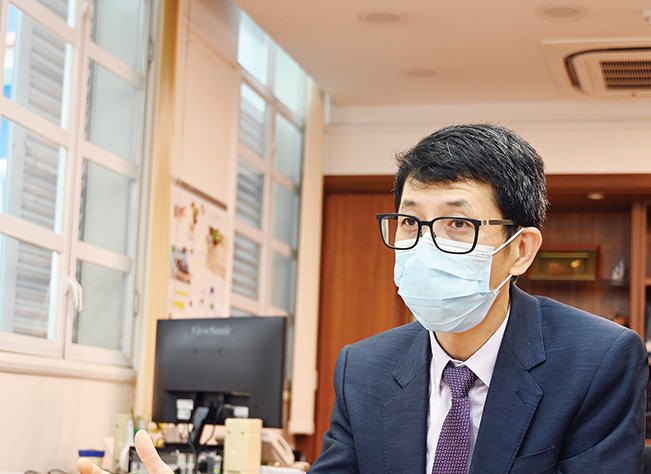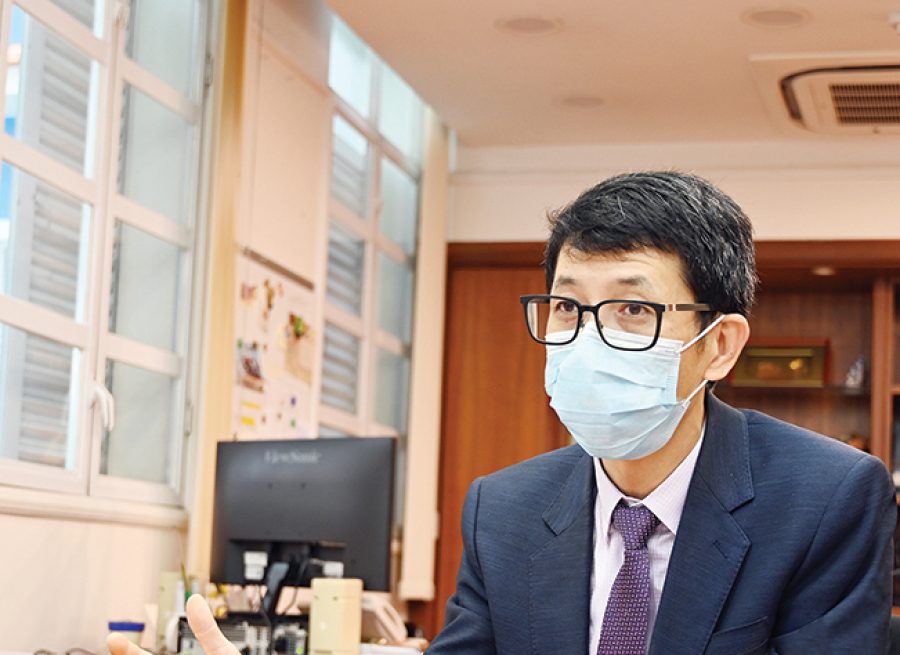The novel coronavirus (Covid-19) has impacted lives in different ways and at different levels. While schools and businesses were suspended so that people could be safe at home, some social services had to continue to ensure that senior citizens living alone, single-parent families and those with disabilities were properly looked after and protected during the pandemic.
Due to the severity of the virus situation, the government ordered the halting of the operation of 171 social service facilities, such as crèches, elderly day-care centres and rehabilitation centres.
“Stopping these services for us was a big challenge,” Social Welfare Bureau (IAS) President Wilson Hon Wai said, explaining that people were using those services because they couldn’t manage at home by themselves.
Hon said that suspending those services was not the “perfect solution” but as a measure to control the epidemic, it was the right decision the government made to guarantee the safety of people who use the services, particularly senior citizens who are at a particularly high risk of being infected.
“None of us have experienced such a challenge, and when we were faced with it, we never thought it would turn out to be like this. There aren’t any protocols for this situation, and everything was decided at a moment’s notice,” Hon said, pointing out that all decisions were made out of concerns for people’s safety, from which the whole society benefits.
“Each day has been a challenge for everyone because there are no case studies for us to refer to, especially when the situation becomes complicated and different people have different needs all of a sudden,” he said, recalling how decisions would be made in a meeting that needed to be implemented the following day.
With the epidemic experience, Hon said his biggest takeaway is to have several plans and to plan a few steps ahead for every situation so that when it happens, actions can be taken aptly and quickly.
“There should be several plans behind every policy. We at least have three plans on hand ready for however the situation turns out to be,” Hon said.
Services continue
Considering the needs of senior citizens and people with disabilities, the bureau maintained the operation of 89 social services and facilities such as nursing homes and a 24-hour emergency service, as well as outreach, transport and home care support to ensure that 5,700 of these service users were looked after physically and mentally.
This also included delivering meals to the elderly living on their own and those with special needs, assisting 6,452 people to apply for their government-subsidised consumption smartcards and distribute the smartcards directly to 10,288 people, helping people who don’t know how to use a smartphone or the internet to obtain their digital Health Codes that are required to enter government premises and even some private buildings, explaining the latest arrangements for border crossings, conducting video call counselling and releasing videos for physiotherapy exercises that people can do at home.
From the end of January to 23 June, the bureau handled 76 cases of mental and emotional problems through its counselling hotline (2826 1126, available during office hours).
“People shouldn’t underestimate how difficult it can be to stay at home, it’s not that simple,” Hon said, “Each person has their own schedule and there could be clashes when the whole family is at home for a long period of time, so setting aside some ‘me time’ for yourself is important.”
Hon pointed out that there was a time when civil society was “divided” when the government decided to help Macao residents who were overseas returnees, and the bureau took the initiative to calm the public’s concern and ask people to be considerate as being a citizen in such a small city, people are virtually each other’s next of kin.
“We need to support each other, if not, there could be adverse behaviour,” Hon said, adding that “in situations like this, personal gain needed to be put aside as public health comes first.”
Due to border entry restrictions, the bureau has also assisted staff members carrying out essential social services to undergo quarantine and arranged local temporary accommodation for 700 non-resident workers who normally commuted between Macao and Zhuhai so that they could live and work in Macao. So far, the bureau has arranged for 5,438 staff members at 239 social service facilities to take the nucleic acid test (NAT).
In addition, the bureau has been providing assistance to people arriving in Macao who were required to undergo medical observation that could take up to eight hours, by giving them food, water and blankets amounting to some 790,000 items.
“For hygiene purposes, blankets need to be washed and disinfected each time they are used, and we had a lot to do in a short period of time. Many businesses were closed, so we reached out to Fuhong Society’s Happy Laundry [social enterprise] to do the job,” Hon said.
Offering charcoal during snow
Likening social services to “offering charcoal during snow”, a Chinese idiom for “timely help”, Hon said that although the government is cutting its budget, resources for people’s livelihoods and welfare won’t be reduced.
“So don’t worry, the government will look after the vulnerable,” he said.
According to IAS information, the bureau has waived the fees for subsidised crèches since February and waived or refunded the annual licence fees for all types of social service facilities this year.
In addition, the bureau has given an extra payout in March to about 3,200 families that regularly receive financial support, and will issue another special payout in September. In May, the bureau granted a special subsidy to three types of socially vulnerable families – single parents, those suffering from chronic illnesses and those with disabilities, and there was one last month too.
“We might have stopped some services but we haven’t stopped giving out or cutting down on resources,” Hon said, pointing out that to save money, the bureau would not be providing funding to associations to hold non-essential activities or celebration dinners.
“The majority of the IAS budget is given out, such as the subsidies for senior citizens, people with disabilities and low-income families, as well as financial support for the operation of more than 200 subsidised social service centres. All these can’t be stopped, so we cut costs from the bureau’s own expenditure,” Hon added.
Now that most of the social services and welfare have resumed and are taken care of, the bureau has already started work on the government’s next big project, which is a housing scheme for senior citizens.
“It isn’t an easy task. The housing scheme for seniors is unprecedented and innovative, and time is pressing. At the moment the site for seniors’ housing is only a plot of land and we have only a few years to develop it for senior citizens to live in, so we’re planning the housing typologies now to align with the construction progress,” Hon said.
At the same time, a bill for the scheme is being drafted listing out the details and eligibility requirements, and it will take time, according to Hon.
“We can’t waste another minute. We can’t still be without a law when the flats are already built. But the law is more unpredictable than construction because there are consultations and everyone has their own opinions,” Hon said.
The government’s housing for seniors aims to encourage them to rent out their walk-up flats so they can rent a flat tailor-made for the elderly with lifts instead. The senior citizens’ housing estate will have medical and recreational facilities, an activity centre, home care service and smart amenities.
(The Macau Post Daily/Macau News)






